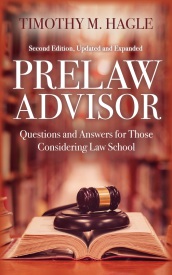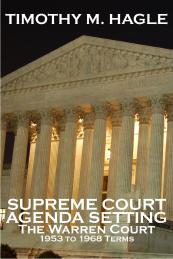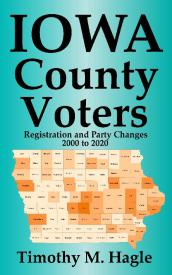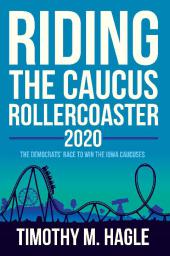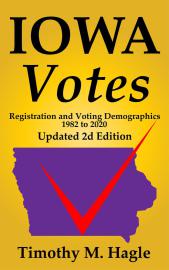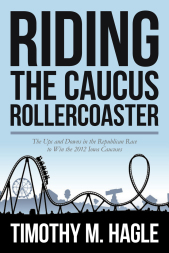
Contact Info
347 Schaeffer Hall
319-335-2348
timothy-hagle@uiowa.edu
Twitter: @ProfHagle
Fall 2024 Office Hours
Tue & Th: 4:45-6:15
Mailing Address
Dept of Political Science
341 Schaeffer Hall
20 E. Washington Street
The University of Iowa
Iowa City, Iowa 52242
News
Posted updated Prelaw FAQ for UI students
New Book, Riding the Caucus Rollercoaster 2024, published in paperback and for Kindle devices.
Posted updates to 12 papers in Iowa Voting Series for 2022 election data
New Book, Supreme Court Agenda Setting: The Warren Court, published for Kindle devices and computers with Kindle reader.
Published updated and expanded edition of Prelaw Advisor in paperback and for Kindle readers
My books
Legal and Judicial Books
Prelaw students occasionally ask me to recommend books related to the law. There are, of course, lots of legally and judicially related books available, the trick is in finding ones that are interesting or worthwhile. Below is the list of books that I thought would be of value in one way or another.
I've divided the list into two broad categories Fiction and Non-fiction. Both lists include the author(s) and title and in the non-fiction list I've included an indication of the book's subject. Each title links to a paragraph that provides a very brief description of the book and a few comments about why I thought it worth being on this list. (Note: I've not included self-help type books on this list, but I mention a few such books on my Prelaw FAQ page.)
Some of the listed books are quite new and some are very old. Most of the older books are probably available in used bookstores or as special orders. If you want to know if a particular book is still available, and possibly order it, you can search Amazon.com.
Fiction
- Grisham, John, The Firm
- Grisham, John, The Client
- Grisham, John, The Pelican Brief
- Harris, Thomas, The Silence of the Lambs
- Harris, Thomas, Red Dragon
- Lee, Harper, To Kill a Mockingbird
- Lindsay, David, Mercy
Non-Fiction
- Adler, Stephen, The Jury (examines how juries work)
- Bronner, Ethan, Battle for Justice (Bork confirmation hearings)
- Bugliosi, Vincent, with Curt Gentry, Helter Skelter (Charles Manson murder case)
- Bugliosi, Vincent, with Ken Hurwitz, Till Death Us Do Part (another murder case)
- Bugliosi, Vincent, Outrage (OJ by a former LA prosecutor)
- Darden, Christopher, with Jess Walter, In Contempt (OJ by one of the prosecutors)
- Dershowitz, Alan, The Abuse Excuse (examines the question of personal responsibility)
- Dershowitz, Alan, Reasonable Doubts (OJ by a member of the defense team)
- Douglas, John, and Mark Olshaker, Mind Hunter (FBI's Serial Crime Unit)
- Katz, Burton, Justice Overruled (Los Angeles DA and trial court judge's view of the criminal justice system)
- Phelps, Timothy, and Helen Winternitz, Capitol Games (Thomas confirmation hearings)
- Rehnquist, William, The Supreme Court (sitting justice's view of the Supreme Court)
- Rodell, Fred, Nine Men (political history of the Supreme Court to 1955)
- Rothwax, Harold, Guilty (New York trial judge's comments on the criminal system)
- Sheindlin, Judy, Don't Pee on My Leg and Tell Me It's Raining (NY juvenile and family court judge's comments on the judicial system)
- Sullivan, Timothy, Unequal Verdicts. (Central Park jogger case)
- Woodward, Bob, and Scott Armstrong, The Brethren. (inside the early Burger Court)
Fiction
- Grisham, John, The Firm, The Client, The Pelican Brief. I suppose you would have to be living under a rock not to know about either Grisham's books or the movies that have been made from them. The critics have not been particularly kind to Grisham's books, suggesting that they lack depth, etc. Perhaps, but if you are interested in light reading with a legal storyline, these are pretty good. The Firm is the story of a law school hot shot that gets a job working in a mob-related law firm and how he manages to save himself and get rich at the same time. (I should note that the book was much better than the movie--though I suppose that's not saying a lot.) In The Client, a kid sees a mob guy kill himself and then hires an attorney who has more heart than luck to protect him from the good guys and the bad guys. The Pelican Brief is about a law student who discovers a plot to kill a Supreme Court Justice.
- Harris, Thomas, The Silence of the Lambs and Red Dragon. Both books involve attempts to catch a serial killer, and both involve the character Hannibal "the Cannibal" Lecter. In Silence, the FBI has to seek the help of the captured Lecter to catch another serial killer. Dragon is basically more of the same.
- Lee, Harper, To Kill a Mockingbird. This book is really a "growing up" story of a small girl in a Southern town of the depression-era. The girl's father, Atticus Finch, is a lawyer and there is an important trial in the story, which makes it worth listing here.
- Lindsay, David, Mercy. Here a Houston dectective is tracking a serial killer. The twist is that the murders take place in the context of sexual role-playing and the victims seem to know their killers. Needless to say, this book contains a fairly strong sexual element, but the story is good and offers some interesting twists.
Non-Fiction
- Adler, Stephen, The Jury. Adler examines the jury system by reconstructing how the juries functioned in seven cases. This book is of particular interest given the questions raised in most people's minds about juries after the Rodney King and OJ verdicts.
- Bronner, Ethan, Battle for Justice: How the Bork Nomination Shook America. I'm not sure the Bork nomination "shook" America, but this is a good account of the politics behind the nomination and the confirmation hearings.
- Bugliosi, Vincent, with Curt Gentry, Helter Skelter. Bugliosi was the Los Angeles County prosecutor who tried Charles Manson for the Tate-LaBianca murders. (This was back when the LA County District Attorney's office could actually win a high-profile case. Bugliosi won 105 of 106 felony jury trials.) The book opens with descriptions of the murders, but what really makes the book an interesting read is how Bugliosi managed to build and present his case--particularly against Manson who was not present at either murder site.
- Bugliosi, Vincent, with Ken Hurwitz, Till Death Us Do Part. Another murder case Bugliosi prosecuted where there was no smoking pistol, no physical, evidence, and no living witnesses.
- OJ-Mania: Outrage by Vincent Bugliosi, In Contempt by Christopher Darden, and Reasonable Doubts by Alan Dershowitz. There are probably dozens of books about the OJ trial by all manner of participants and hangers-on. I decided to try a balanced approach: one from the defense, one from the prosecution, and one from someone not connected with the trial. (I've also picked up the book by the two investigating officers and Fuhrman's to get the police point of view, but I haven't read them yet.) It probably would have been best to start with the prosecution's perspective and then go to the defense to mimic the way the cases are presented in court, but I read Dershowitz's book first. Dershowitz is a well-known Harvard law professor and appellate attorney. His main function as part of the Simpson legal team was to prepare for the appeal if Simpson had been found guilty. He does not try to convince readers that Simpson didn't commit the murders, but rather that there was sufficient reason for the jury to have had reasonable doubts about it. Darden, of course, was one of the main prosecutors during the trial. A good portion of his book deals with his own background. This material is interesting for several reasons, not the least of which is how it sets the stage for how he had to deal with the reaction from the black community for his role in the prosecution. The sub-title of Bugliosi's book is The Five Reasons Why O.J. Simpson Got Away With Murder. The prosecution receives the most criticism for a poorly argued and presented case, but Bugliosi also criticizes Judge Ito for not being able to control his courtroom. Bugliosi is fairly specific in his criticisms and gives examples of how he would have handled various aspects of the case.
- Dershowitz, Alan, The Abuse Excuse: And Other Cop-Outs, Sob Stories, and Evasions of Responsibility. The title pretty much says it all. This is a collection of his essays, mostly his newspaper columns, on the topic of personal responsibility. Although Dershowitz is usually considered a liberal, most of the arguments he makes in this book are consistent with conservative notions of personal responsibility.
- Douglas, John, and Mark Olshaker, Mind Hunter. Douglas is one of the founders of the FBI's elite Serial Crime Unit. He tells how the unit came to be and describes several cases he worked on. My only complaint is that the case descriptions only run about 20 pages each, which isn't enough space to get into the details to the extent I would have liked.
- Katz, Burton, Justice Overruled: Unmasking the Criminal Justice System. Katz is a former Los Angels prosecuting attorney and trial court judge who now is a TV commentator and radio talk-show host. Like the other two books by trial court judges (Rothwax and Sheindlin), Katz points out some of the more egregious examples of problems in the criminal justice system. Unlike the other two, he delves into these stories in a bit more detail and provides more analysis as to how these stories demonstrate problems in the criminal justice system and how to solve them. Katz covers issues such as the exclusionary rule, "testi-lying," jury selection, problem judges, witnesses, and the abuse excuse (see Dershowitz for more on the abuse excuse). I liked this book so much I plan to assign it in my Criminal Justice course.
- Phelps, Timothy, and Helen Winternitz, Capitol Games. Given how political the Thomas confirmation hearings became, particularly after Anita Hill made her accusations, this book does a good job of presenting a fairly objective account of the events. Two other books of a more partisan flavor may also be of interest. The first is David Brock's The Real Anita Hill. As the title suggests, Brock takes an in-depth look at Anita Hill to determine whether she was really the shy and conservative law professor the media made her out to be. Jane Mayer and Jill Abramson provide the liberal response in Strange Justice. They attempt to refute Brock's arguments and to show that Hill was telling the truth. I say "attempt" because in a response in The American Spectator, the magazine for which Brock is an investigative reporter, he takes them to task for their poor grasp of the facts, etc. (When offered an opportunity to respond they essentially refused to defend their work.) If you really want to know who said what during the hearings, you can also obtain a copy of The Complete Transcripts of the Clarence Thomas--Anita Hill Hearings October 11, 12, 13, 1991. Note: While reading these books, compare the allegations Hill made with those Paula Jones has made against Bill Clinton, and the feminist reaction to each.
- Rehnquist, William, The Supreme Court. This book is a bit autobiography and a bit history of the Supreme Court. Particularly interesting are the later chapters that describe how the Court and the Justices function on a daily basis.
- Rodell, Fred, Nine Men: A Political History of the Supreme Court of the United States from 1790 to 1955. The title pretty well sums it up. This book gives a good overview of the politics behind the Court during it's first 165 years. This is a good companion to The Brethren, but it's less gossipy.
- Rothwax, Harold, Guilty: The Collapse of Criminal Justice. This is a view of the criminal justice system by a New York state trial court judge. Rothwax selects several topics and mainly uses anecdotes to illustrate the problems in the system. There isn't much analysis of the problems Rothwax raises, but the anecdotes offer a more "in the trenches" perspective on some of these problems. (Also see the books by Judges Sheindlin and Katz.)
- Sheindlin, Judy, Don't Pee on My Leg and Tell Me It's Raining. Sheindlin was a New York City juvenile and family court judge. In focusing on juveniles in the first part of her book she gives us a different perspective on the criminal justice system compared to Rothwax or Katz. Her experiences as a family court judge give us a view of many abuses in welfare and family law. Like Rothwax she primarily relies on anecdotes to make her points, but she also offers comments on how the system might be fixed. There isn't much analysis here, but the book is interesting, a fast read, and it covers less familiar areas of the judicial system.
- Sullivan, Timothy, Unequal Verdicts. Sullivan is a journalist who tells the story of how Elizabeth Lederer prosecuted the Central Park Jogger trials. The title refers to the different verdicts received by the defendants because of their age and the particular evidence against them.
- Woodward, Bob, and Scott Armstrong, The Brethren. Woodward and Armstrong take a political and fairly gossipy look at the 1969 through 1975 Terms of the Burger Court. Rumor has it that a good deal of the "inside" information came from Brennan's law clerks, so it's no surprise that Brennan comes off looking like a saint and Burger a buffoon. Even so, several very important cases were decided during this period (e.g., Roe v. Wade) and the descriptions of how the justices dealt with these cases, and each other, makes for interesting reading.
